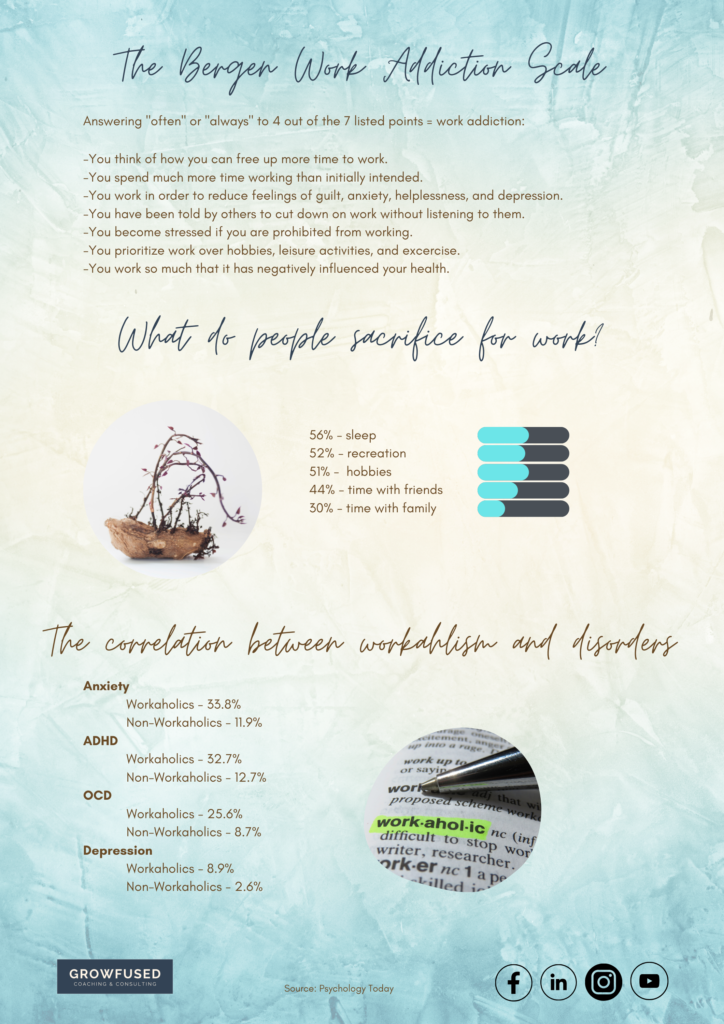What are the main causes of workaholism?
Workaholism is an addiction to work, and while it may not be in a diagnostic book or have a certain list of official criteria, there is a lot of evidence to suggest that a hyper fixation on work functions like other types of behavioral addictions. Like other addictions, being a workaholic can impact and change people’s personalities and alter their value system.
But scientists are increasingly finding that workaholics are typically less productive on average than employees who simply manage their time more effectively. Workaholism is like any addiction — those addicted don’t know when to stop, have poor impulse control, higher health risks, worse relationships, and ultimately disappointment when they find they achieved goals that benefited their employer, but their life remains empty.

What are the main causes of workaholism?
- Motivational causes: Workaholics don’t work because they enjoy the work — they work because they feel like they should.
- Cognitive causes: Workaholics find it difficult to stop thinking about work, even when they’re not working.
- Emotional causes: Workaholics feel anxious and guilty when not working.
- Behavioral causes: Workaholics have a tendency to work more than their companies expect from them.
What workaholism is NOT
You may think that you are a workaholic — but, perhaps you are just a hard worker with a good work ethic and work engagement who occasionally works long hours.
People who work hard are focused on a certain priority they need to finish before a deadline, so they put in extra hours and effort. Afterward, they go back to their normal work routine.
Non-workaholics stop working hard once they reach success on their goals. But, for workaholics, enough is never truly enough — the goal is never fully reached and they never feel the sense of accomplishment that comes with objective success.
Workaholics tend to work long hours. However, working long hours doesn’t necessarily mean that you’re a workaholic. According to the Harvard Business Review, the difference between being a workaholic and working long hours is the ability to switch off after work.
Some people may appear like they have workaholic tendencies, because they simply love their job, and love thinking about what they need to work on, and how they will approach their future work. But, there is a distinction between people who constantly worry about work and those who often think about their work because they enjoy it — especially in terms of health. Workaholics have an unhealthy need to work obsessively, rather than a healthy desire to work obsessively.
Ways to overcome workaholism:
There are significant steps that you can take on your own to become healthier, steps that you would need to take even if working with a professional.
Here are eight ways to overcome your work addiction:
- Assess yourselfTake the self-diagnostic test listed below to determine whether you are a workaholic.
- Uncover & understand
Identify what purposes work may serve in your life other than providing income (perfectionism, higher self-esteem, avoidance etc.) - Set priorities for meaning & purposeConsider carefully what is most important to you. Letting go of any habit is easier when you identify something more valuable to hold on to.
- Set limitsSet limits for how many hours per week or per day that you will work, how much you will work on weekends, and your use of devices.
- Substitute active healthy behaviorsUse exercise, meditation, deep breathing, and mindfulness to lower anxiety and slow down. Remember that rest and leisure can actually increase your productivity.
- Make plans for after workBy setting plans up for after work, you have commitments that you can look forward to to help you set healthy boundaries for being done for the day. Having a routine will help you manage your time better.
- Speak to a therapistIt’s important to get professional help if you feel that your coping mechanisms aren’t working.
- Engage with Workaholics Anonymous
Share your experience, strength, and hope with fellow workaholics and help others to recover from workaholism.
Steps to consider if you are overworked:
- Commit to fixing the problem
The most important step is admitting there is a problem. Set boundaries, create healthy habits and act upon them. Give up multitasking, exercise regularly, eat healthy and make sure to get enough of rest. - Talk to your boss
Have an honest conversation with your leader and come up with a plan how you can divide some of your work or deprioritizing some tasks. - Seek professional help
We highly recommend seeing a professional. We can help you walk through why you might be struggling and give you the tools you need to feel better. - Make sure you’re in the right job
Maybe you’re in a toxic work environment that’s been contributing to your need to achieve and prove yourself, or maybe you know your boss would roll their eyes at the idea of you taking a vacation. Seriously consider those things and know that no job is worth risking your well-being.
Although some CEOs and managers might be thrilled when they’ve hired someone who is willing to work all hours of the day and night, in the long-term, it hurts companies – and individuals. Studies show that people who work more than 50 hours per week were likely to suffer both physical and mental health consequences.
Being a workaholic shouldn’t be a status symbol – instead it should be treated as a serious condition. One of the main problems with treating workaholism is that it is not yet recognized as an addiction in the same way alcohol, drug, or gambling addictions are diagnosed.
Subscribe To Our Newsletter
Consider subscribing if you don’t want to miss out on amazing offers and when new posts go up!!

